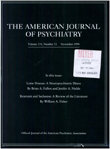Nicotine withdrawal symptoms and psychiatric disorders: findings from an epidemiologic study of young adults
Abstract
OBJECTIVE: Earlier, the authors reported on the association of nicotine dependence with major depression and anxiety disorders in a group of young adults. This report describes the occurrence of withdrawal symptoms and their sociodemographic and psychiatric correlates in persons in that group who tried unsuccessfully to abstain from smoking. METHOD: A random sample of 1,007 members of a health maintenance organization, 21-30 years old, were interviewed with a revised version of the NIMH Diagnostic Interview Schedule. Data on nicotine withdrawal came from a subset of 239 smokers who had tried unsuccessfully to quit or cut down on smoking. RESULTS: With two exceptions, each of the DSM- III-R nicotine withdrawal symptoms was reported by more than one-half of these smokers. Withdrawal symptoms were more severe in white than in black smokers but were unrelated to sex, educational level, or marital status. Persons with histories of major depression or any anxiety disorder reported more severe withdrawal symptoms than persons with neither of these disorders. Severity of withdrawal, or any specific symptom, did not account for the association between major depression and continued smoking. Furthermore, severity of withdrawal was unrelated to continued smoking. CONCLUSIONS: While the long-term clinical significance of nicotine withdrawal is unclear, the evidence indicates that in the general population, abstinence from smoking is associated with a variety of disturbances, including a craving for cigarettes, dysphoria, and symptoms of irritability or nervousness. In this study disturbances were more severe in persons with histories of major depression or anxiety disorders.
Access content
To read the fulltext, please use one of the options below to sign in or purchase access.- Personal login
- Institutional Login
- Sign in via OpenAthens
- Register for access
-
Please login/register if you wish to pair your device and check access availability.
Not a subscriber?
PsychiatryOnline subscription options offer access to the DSM-5 library, books, journals, CME, and patient resources. This all-in-one virtual library provides psychiatrists and mental health professionals with key resources for diagnosis, treatment, research, and professional development.
Need more help? PsychiatryOnline Customer Service may be reached by emailing [email protected] or by calling 800-368-5777 (in the U.S.) or 703-907-7322 (outside the U.S.).



